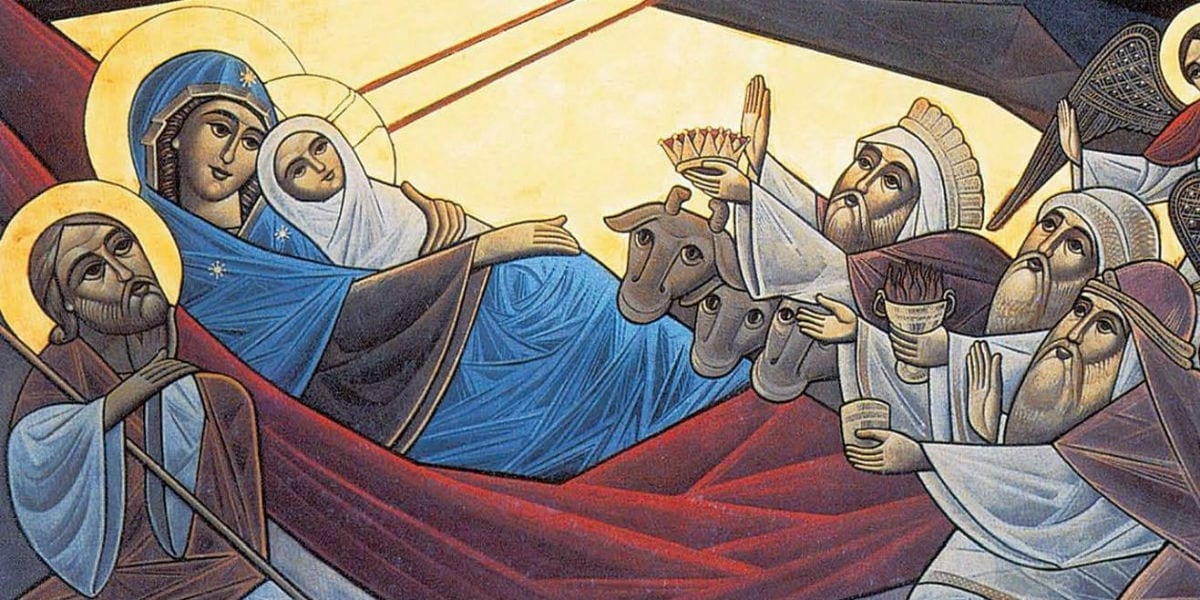Regina Caeli – Queen of Heaven, Rejoice!
The Regina Caeli, Latin for “Queen of Heaven,” is a hymn and prayer ...

This post is also available in: Spanish, Italian
The Feast of the Holy Family is an essential part of the Christmas Season. It makes clear that the Incarnation means not just that the Divine Word assumed a human body, but entered into every aspect of human life, including family life sanctifying it all and making it a path to holiness.
To LISTEN to this post read by Dr. Italy, click on the play arrow on the left, directly below this paragraph.
Every year right after Christmas, we celebrate the feast of the Holy Family. There is a reason for this. It’s easy to think the “incarnation” means God took on a human body.
But there is much more to it than that. In Jesus, God unites himself to an entire human nature. He fully enters into human experience, with all its peaks and valleys. And a part of that human experience, with more than its share of peaks and valleys, is family.
Jesus spent over 90% of his years in the obscure nitty-gritty of family life. Though only a few chapters are devoted to this lengthy period, what they reveal is significant.
First of all, despite the cuddly image of our nativity scenes, the original Christmas was anything but cozy. A woman nine months pregnant rides 75 miles on the back of a donkey over bumpy, dusty roads so she can have her baby in a stable full of dirty, smelly animals. Quickly after the birth they have to pick up and flee for their lives, seeking asylum in a foreign land. A few years later, the now adolescent son goes missing for several days, and there ensues a conversation characterized by no little emotion. Joseph is a saint, Mary is without sin, Jesus is God incarnate, yet there are still challenges, hardships, tense moments, and opportunities for misunderstanding. Welcome to real family life.
All things created by God are good. Human beings and human life are very good according to Genesis chapter 1. Yet in assuming a human body, the Divine Word elevated its dignity, sanctifying it, and ennobling it. In accepting baptism from his cousin John, Jesus sanctifies water and, in baptism, makes it an instrument of his sanctifying power. In entering into family life, Jesus does the same. The family, up til now naturally good, becomes an instrument of sanctification and growth in holiness.
As a teen, I thought a serious pursuit of holiness required opting out of marriage to enter a monastery. Holiness was about lots of quiet prayer and apostolic work. Noisy family life was a distraction from this. The role of married folks was limited to frequenting the sacraments, obeying the Ten Commandments, and getting into heaven after a lengthy stay in Purgatory.
The feast of the Holy Family shows how far off-base I was. It reminds us that, as Vatican II teaches, all human beings are called to the heights of holiness. That all states in life, including student, teenager, and parent, offer abundant opportunities to grow in faith, hope, and love. That the nitty gritty of family life, if approached right, can be a road to profound personal transformation and communion with God.
Think about it. The creator of the universe spent most of his human life as a craftsman, working with dad in the family business and ultimately taking it over. Mary, the holiest of all creatures, spent most of her time changing diapers, cooking, and cleaning. The secret to holiness is not to do extraordinary things, but to do ordinary things with extraordinary love and gratitude (Colossians 3:15-17).
The word seminary means “seedbed.” It is a greenhouse where, in a sheltered environment, vocations can develop till they can not just survive in the real world, but actually thrive and bear fruit there.
The family is the original seminary. In its soil is sown the call to share in Christ’s holiness and mission. Ironically, tending to the seedlings causes the parent/gardeners to grow as well. So family, in God’s plan, is a community where everyone has growing to do. Maybe that’s why Col 3 talks so much about forgiveness and forebearance!
The bottom line is this–we don’t become holy despite the hustle-bustle of family life, but in and through it.
For more great resources for Christmas, visit the Christmas – Incarnation section of the Crossroads Initiative Library.
This post is offered as a reflection on the readings for the Feast of the Holy Family, cycle C (Sirach 3:2-7, 12-14; Psalm 128:1-5; Colossians 3:12-21; Gospel: Luke 2:41-52)
Banner image of the Holy Family of Nazareth used by permission of Stéphane René’s. To view more of his beautiful icons, please visit http://www.copticiconography.org/Iconographer.html.
No Comments